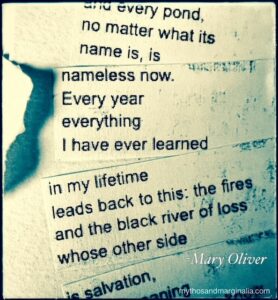I received a letter this past week from a faraway friend whom, over the years, has shared with me details and the dimensions of her life. The letters are always a joy to receive and the dialogue from the back and forth correspondence, over time, is endearing.
In the most recent letter, she shared news of intense sadness as her father, her “rock”, had recently passed away. She is now grieving.
We all deal with grief personally, intimately and unknowingly. It is always unexpected: you don’t plan for grief, in any circumstance.
Grief consumes you. It forces you to think about an awful lot of things, and our relationship with the departed is both embraced and questioned.
It is only natural.
My friend wrote that at the memorial service, she and her sister gave offered the eulogy, and then she recited a poem that was dear to her.
I was reminded, as she shared her thoughts and the written words, of how we can each find comfort and solace in poetry. A poem can make our emotions become clearer by offering perspective.
Sometimes, when we can’t find our own words, those of someone else find their way to us. A poem captures both life and death, and each element and emotion in between.
Poetry offers a deeper peace.
With a poem there is always room for more.
In Blackwater Woods
by Mary Oliver
Look, the trees
are turning
their own bodies
into pillars
of light,
are giving off the rich
fragrance of cinnamon
and fulfillment,
the long tapers
of cattails
are bursting and floating away over
the blue shoulders
of the ponds,
and every pond,
no matter what its
name is, is
nameless now.
Every year
everything
I have ever learned
in my lifetime
leads back to this: the fires
and the black river of loss
whose other side
is salvation,
whose meaning
none of us will ever know.
To live in this world
you must be able
to do three things:
to love what is mortal;
to hold it
against your bones knowing
your own life depends on it;
and, when the time comes to let it go,
to let it go.
04/30/2023 j.g.l.

Leave a Reply